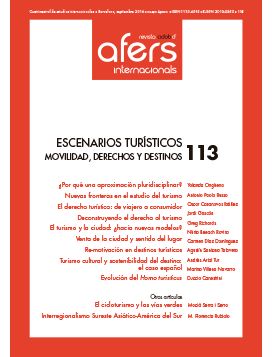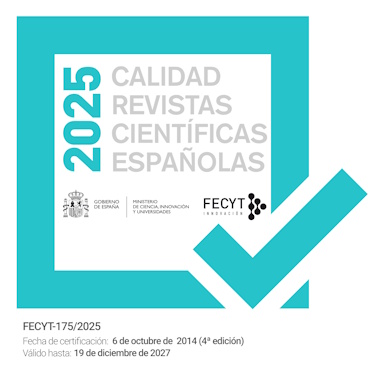The evolution of homo touristicus
Keywords:
homo touristicus, tourism, mobility, neocolonialism, technologies, terrorism, securityAbstract
Revista CIDOB d’Afers Internacionals, nº 113
Quadrimestral (May-September 2016)
ISSN:1133-6595 | E-ISSN:2013-035X
DOI: https://doi.org/10.24241/rcai.2016.113.2.149
This article looks at the evolution of homo touristicus, a concept that originally referred to a person with a decent level of income who travelled for pleasure for short periods of time, taking advantage of the geoeconomic disparity between their habitual residence and the destinations chosen. This category has grown to include new sub-species and varieties that take in a wide range of forms and motivations and goes far beyond the old ways of being a tourist. These days, tourism is constructed according to new tastes and new technologies; it seems genetically modified and as such it promotes itself and consumes. Although there is still a generic demand for escape, the settings have changed. This paper sets out some of these changes, goes on to note the particular obsession with the safety of the tourist and, finally, appeals for a harmonious development of tourist activity.
>> The full text articles of this issue are available only in Spanish language
References
Apostolopoulos, Yiorgos; Leivadi, Stella y Yiannakis, Andrew (eds.). The Sociology of Tourism. Londres: Routledge, 1996.
Augé, Marc. Disneyland e altri nonluoghi. Turín: Bollati Boringhieri, 1999.
Bowles, Paul. The Sheltering Sky. Londres: John Lehmann, 1949. Traducción al español: El cielo protector. Barcelona: Seix Barral, 2010 [1949]. Canestrini, Duccio. Turistario. Luoghi comuni dei nuovi barbari. Milán: Baldini&Castoldi, 1993.
Canestrini, Duccio. Non sparate sul turista. Dal turismo blindato al viaggio permeabile. Turín: Bollati Boringhieri, 2004. Traducción al español: No disparen contra el turista: un análisis del turismo como colonización. Barcelona: Bellaterra, 2009.
Cazes, Georges. Les Nouvelles Colonies de vacances? París: L’Harmattan, 1989.
Cazes, George. Tourisme et Tiers-Monde, un bilan controversé. París: L’Harmattan, 1992.
Cohen, Erik. «Authenticity and commoditization in tourism». Annals of tourism research, vol. 15, n.º 2, (1988), p. 371-386.
Diller, Elizabeth y Scofidio, Ricardo (eds.). Visite aux armées: tourisme de guerre/Back to the Front: Tourism of War. Fond Régional d’Art Contemporain de Basse-Normandie, 1994.
Foro Social Mundial. «O turismo e a inclusão social nos constrangimentos do processo civilizatório da pós-modernidade». Segundo FSM, Porto Alegre, 2002 (en línea) http://www.ivt-rj.net/destaques/forum/index.htm [Fecha de consulta 10.10. 2015].
Hall, Colin Michael. Tourism and Politics: Policy, Power and Place. Nueva York: John Wiley, 1994.
Houellebecq, Michel. Piattaforma. Milán: Bompiani, 2001. Traducción al español: Plataforma. Barcelona: Anagrama, 2002.
Kincaid, Jamaica. Un pequeño lugar. Tafalla: Txalaparta, 2003.
Krippendorf, Jost. Les Vacances, et après? Pour une nouvelle compréhension des loisirs et des voyages. París: L’Harmattan, 1987.
Mbaye Dieng, Isidore y Bugnicourt, Jacques. Touristes-rois en Afrique. DakarParís: Enda/Kartala, 1982.
Nash, Dennison. «Tourism as a Form of Imperialism», en: Smith, Valene L. (ed.). Hosts and Guests: The Anthropology of Tourism. Philadelphia: University of Pennsylvania Press, 1989, p. 37-54.
Palmer, Catherine. «Tourism and Colonialism: The Experience of the Bahamas». Annals of Tourism Research, vol. 21, n.º 4 (noviembre 1994), p. 792-811.
Tirado, Daniel. Viajando sin papel higiénico. Nomos Impresores, 2011 (en línea) http://es.calameo.com/read/001011478257472b9bad2
Van Houts, Didier. International Tourism in Third World Countries: a controversial Topic. Marsella: Centre des hautes études touristiques, 1991.
Yourcenar, Marguerite. Il giro della prigione. Milán: Bompiani, 1991. Traducción al español: Una vuelta por mi cárcel. Madrid: Alfaguara, 1999.













